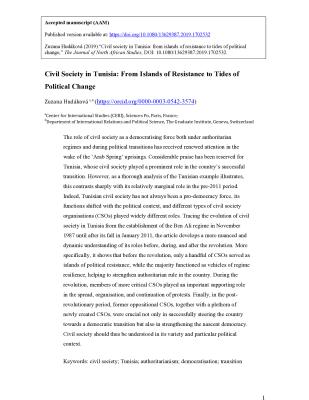The role of civil society as a democratising force, both under authoritarian regimes and during political transitions, has received renewed attention in the wake of the ‘Arab Spring’ uprisings. Considerable praise has been reserved for Tunisia, whose civil society played a prominent role in the country’s successful transition. However, as a thorough analysis of the Tunisian example illustrates, this contrasts sharply with its relatively marginal role in the pre-2011 period. Indeed, Tunisian civil society has not always been a pro-democracy force, its functions shifted with the political context, and different types of civil society organisations (CSOs) played widely different roles. Tracing the evolution of civil society in Tunisia from the establishment of the Ben Ali regime in November 1987 until after its fall in January 2011, the article develops a more nuanced and dynamic understanding of its roles before, during, and after the revolution. More specifically, it shows that before the revolution, only a handful of CSOs served as islands of political resistance, while the majority functioned as vehicles of regime resilience, helping to strengthen authoritarian rule in the country. During the revolution, members of more critical CSOs played an important supporting role in the spread, organisation, and continuation of protests. Finally, in the post-revolutionary period, former oppositional CSOs, together with a plethora of newly created CSOs, were crucial not only in successfully steering the country towards a democratic transition but also in strengthening the nascent democracy. Civil society should thus be understood in its variety and particular political context.



